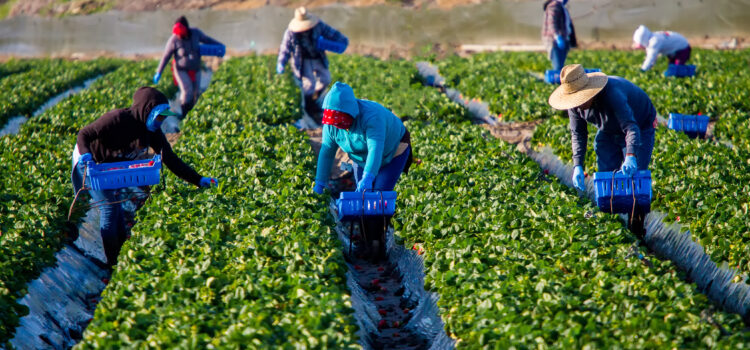
An upcoming press conference at 10 a.m. on Tuesday, February 2 will release a new report highlighting the precarious conditions farmworkers are facing during the COVID-19 pandemic.
In addition to sharing their health, household, and workplace struggles amidst the pandemic, interviews with farmworkers elevate the voices of farmworkers who spoke to uneven distribution of resources, poor enforcement and eroded levels of trust toward government entities.
“Carlos” a farmworker in Kern County expressed bitterness toward the label “essential worker” currently used to describe laborers in the industrial food system.
“We’re supposedly indispensable and essential, but it feels like we’re not essential, as if we are useless trash that you can throw away and then they’ll just hire more people,” said Carlos. “That’s how I feel.”
In-depth interviews in this study document how the pandemic has exacerbated long-standing crises, vulnerabilities, and economic frailties within the food system, heightening insecurity, risk, and health disparities for farmworkers and their families, a news release says.
COFS Phase Two was led by health anthropologists Dr. Bonnie Bade and Dr. Dvera Saxton, in partnership with a team of Research Associates rooted in farmworker communities across the state.
“Farmworkers shared their lived experiences with us, and these must inform our efforts to change the trajectory of the pandemic for rural areas and for immigrant communities who often feel overlooked and forgotten,” said Saxton.
COFS is a collaborative research project facilitated by the California Institute for Rural Studies, with a team of social science researchers and six farmworker-serving community-based organizations: Alianza Ecologista,
Centro Binacional para el Desarrollo Indígena Oaxaqueño, Central California Environmental Justice Network, Comite Cívico del Valle, Farmworker Care Coalition/Vista Community Clinic and Líderes Campesinas.
“The COVID-19 Farmworker Study (COFS) provides urgent insights that can shape equitable COVID-19 responses, policies, and actions in rural and immigrant communities across California,” said Erica Fernández Zamora, a
COFS Phase 2 interviewer and Research Associate. Data from the project is being put to immediate use to advocate for workers who are risking their lives every day to feed California and the nation.
The Phase Two preliminary report will be presented in more detail at a virtual press release on Tuesday, February 2, 2021 at 10 am (see registration info below). Registered participants will receive a press kit including the full Phase Two Preliminary Report (available Feb 1 at 12pm). To register for the Zoom webinar go to: https://us02web.zoom.us/webinar/register/WN_rShid2zCR22Ou1lUTpf9Gg